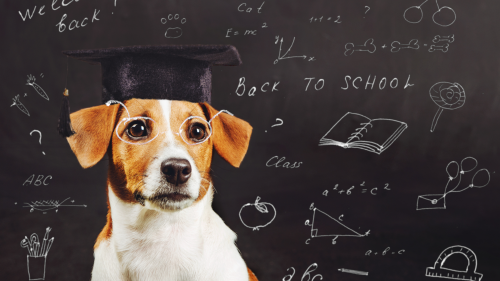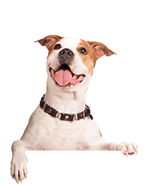Obviously your pup is the cutest, smartest, best behaved dog to ever exist! But have you ever wanted to test just how smart your fur baby truly is? Just like humans, dogs can be smart in many different ways. Luckily, there are lots of fun tests to assess your pup’s intelligence! After all the exciting adventures we’ve had with pups, our dog walkers in Columbus have determined that there’s definite ways to test canine intellect. Let’s dive into our guide to discover the hidden genius in your beloved fur baby!
Basic Signs of Pup Intellect
Every dog has baseline intelligence, a fundamental cognitive capacity that shapes their understanding of the world around them. This foundational intelligence is evident in their ability to grasp basic commands, like responding to their name or coming when called. Dogs, by nature, possess an instinctual intelligence that allows them to sniff out treats and navigate their environment. For domesticated puppies, this baseline intelligence takes on an adaptive quality, with those raised within a consistent family environment showcasing a notable proficiency in learning and problem-solving.
Recent studies also suggest that dogs exhibit emotional intelligence, demonstrating an understanding of human emotions and responding empathetically. This is shown in the way dogs offer comfort to their owners during distress. Beyond the rudimentary skills, a dog’s baseline intelligence is also reflected in more nuanced behaviors, such as seeking affection through deliberate actions, initiating play, and demonstrating problem-solving abilities with activities like solving puzzle toys.
Three Common Types of Intelligence
Instinctive intelligence
Instinctive intelligence, or breed intelligence, is an inherent skill set that dogs are born with, shaped by their breed’s historical purpose. Our Columbus dog walkers frequently walk hounds known for their exceptional scent-tracking abilities. Their innate talent for following scents is a prime example of instinctive intelligence at work, though, sometimes it leads to uncontrollable pulling issues while out on strolls.
Similarly, companion dogs, which we also often care for as pet sitters and dog walkers in Columbus, display a remarkable sensitivity to human emotions. Their ability to read and respond to our feelings is instinctual, making them excellent companions for people seeking emotional support and connection.
Guard dogs, another group we encounter, exhibit a natural propensity for protection and vigilance. Their instinct to watch over and safeguard their environment and people is a testament to their breed’s intelligence. This protective instinct makes them invaluable as both family pets and working dogs.
Retrievers, popular in so many Columbus neighborhoods, demonstrate their breed’s intelligence through their love for fetching and retrieving. This instinct goes back to their historical role in hunting, where they were bred to retrieve game. Their enthusiasm and skill in fetch and similar activities during our walks highlight their inherent abilities.
Adaptive intelligence
Adaptive intelligence in dogs is their ability to learn and solve problems based on their experiences. It’s about how they apply what they’ve learned to new or changing situations. This type of intelligence is one our dog walkers in Columbus, Ohio encounter the most often; the pups have developed many clever ways to communicate their needs and desires. Some have mastered the art of catching our attention, using specific barks, nudges, or even leading us to what they want.
Another classic example of adaptive intelligence that we frequently notice is how dogs remember where treats are stored. They not only recall the location but also often find ingenious ways to indicate their desire for a treat. This ability demonstrates not just memory but also their understanding of how to engage with us to fulfill their needs.
Perhaps the most remarkable display of adaptive intelligence we witness is a dog’s ability to discern different types of outings. They can often tell the difference between a routine walk in their favorite Columbus park and a less exciting trip, like a visit to the vet. This understanding is not just about recognizing patterns but also about interpreting human behavior and environmental cues.
Working Intelligence
Working or obedience intelligence is exactly what it sounds like!
Working intelligence in dogs is evident when they quickly grasp new commands or excel in training environments. They stand out due to their ability to pick up new tricks and commands with ease. This aptitude isn’t just about memorizing commands; it’s about understanding and responding to them, which is a testament to their mental agility and willingness to learn.
Dogs with high working intelligence are often a joy to walk and interact with, as noted by our dog walkers in Columbus, Ohio. They respond promptly to routine commands like ‘sit’, ‘stay’, ‘come’, and even more complex ones. This ability makes them not only delightful companions but also ensures their safety and the safety of others during walks. They’re often the dogs that can masterfully navigate the busy sidewalks of Columbus or calmly handle the bustling environments of popular Columbus pet places.
Fun Ways to Test Your Pup’s Intelligence
Curious about your pup’s intelligence levels? Explore their cognitive prowess with a variety of engaging activities that provide such insight. Remember not to overwhelm your furry friend by attempting all these tests in one go. The key is to make these challenges enjoyable and rewarding, ensuring your dog receives ample affection, pets, and, of course, treats!
If you successfully navigate these tests and decide to integrate them into your dog’s regular routine, you’ll discover significant advantages, especially in terms of training. Our pet sitters in Columbus, Ohio can leverage these tests to not only entertain but also to stimulate the innate and acquired intelligence of the pets under their care. Whether your dog effortlessly masters these challenges or needs a bit of encouragement, one thing remains certain – they are undeniably fur-bulous!
The Towel Test
Cover your dog’s head with a towel or blanket and time how long it takes for them to free themselves. This test evaluates their problem-solving skills and adaptive intelligence, gauging their ability to navigate closed-in spaces.
The Cup Test
Arrange three cups face down and hide a treat under one of them. Distract your dog for a minute, then bring them back to see if they can remember the cup with the treat. This test assesses both adaptive and instinctive intelligence, adding an element of memory recall to the mix.
The Rearrangement Test
If your dog has a favorite spot, move their preferred furniture to another part of the room while they’re away. Challenge them to locate their go-to spot, evaluating their problem-solving abilities.
The Treat Test
Place a treat under furniture that allows your dog to use only their paw to retrieve it. The speed at which they retrieve the treat reflects their problem-solving skills, showcasing their ability to use their physical attributes strategically.
The Door Test
Utilize the layout of your home, especially if you have a fence, to test your pup’s problem-solving skills. Let them out from one door and close it, then open a different door for them to return. Observe whether they rely on your guidance or independently find an alternative entry point.















